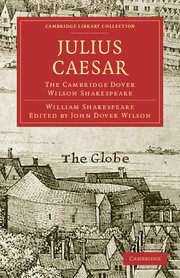THE COPY FOR JULIUS CÆSAR, 1623
Published online by Cambridge University Press: 07 September 2010
Summary
The Folio Julius Cæsar, only substantive text, was pronounced by the Cambridge editors to be ‘correctly printed than any other play’, and even ‘perhaps printed from the original manuscript of the author’. We now realize that what is in question is the tidiness of the copy rather than the competence of the printers, and that such tidiness almost certainly denotes transcription of some kind, probably from the promptbook. Indications of transcription are the absence of those Shakespearian spellings which crop up in other texts, the comparatively correct lineation of the verse and distribution of speeches, and a punctuation which is generally adequate and creates relatively few problems for an editor. The chief features suggesting promptbook origin are certain stage directions connected with ‘noises off’ (thunder and the ‘alarums’ of battle) which seem to have been prompter'es added in the margin, since they sometimes duplicate directions in the centre of the page. The S.D. with which 4.2 opens cannot, again, be derived from Shakespeare's MS.
Yet though pretty confident that we have to reckon with prompt-book influence, I think the actual copy was a transcript from the prompt-book rather than that document itself. In this edition of Shakespeare I have not so far encountered any clear evidence of printing from the prompt-book direct. Indeed, it seems unlikely that the players would have risked the loss of their ‘allowed books’ by sending them to press.
- Type
- Chapter
- Information
- Julius CaesarThe Cambridge Dover Wilson Shakespeare, pp. 92 - 97Publisher: Cambridge University PressPrint publication year: 2009First published in: 1949



